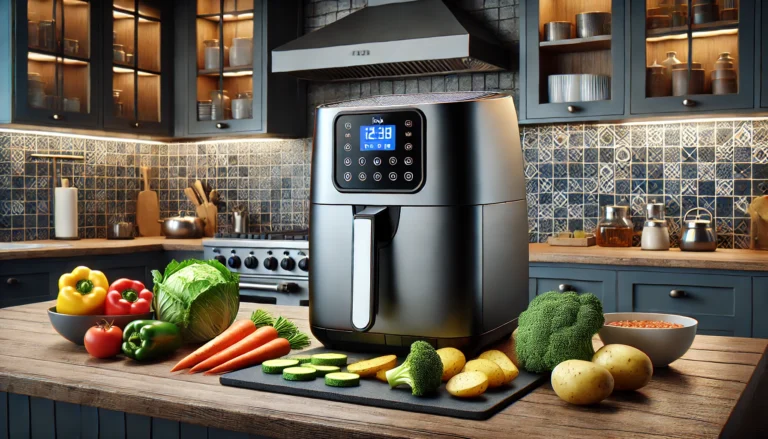Best Stud Finder for Accurate Wall Scanning
Finding studs in walls can be a daunting task, especially for those who are not familiar with the process. Fortunately, stud finders are available to make this task much easier. A stud finder is a handheld device that uses sensors to locate the framing studs behind the drywall.
When it comes to purchasing the best stud finder, there are a few critical factors to consider. One of the most important factors is the type of stud finder. There are three types of stud finders: magnetic, electric, and ultrasonic. Magnetic stud finders use a magnet to locate the nails or screws that attach the drywall to the studs. Electric stud finders use sensors to detect changes in density behind the drywall, while ultrasonic stud finders use sound waves to locate the studs.
Another crucial factor to consider when purchasing a stud finder is its accuracy. A stud finder that is not accurate can lead to costly mistakes, such as drilling into a pipe or electrical wire. The size and weight of the stud finder should also be considered, as a bulky or heavy device can be difficult to maneuver.
After researching and testing several stud finders, we have identified the ones that make finding studs easy and accurate. In the following sections, we will provide an in-depth review of each stud finder, including its features, pros, and cons.
Best Stud Finders
We understand the frustration of trying to locate studs behind walls when hanging shelves, mirrors, or other heavy objects. That’s why we’ve compiled a list of the best stud finders on the market to help you easily and accurately locate studs. Our team has thoroughly researched and tested each product to ensure that they are reliable and efficient. Whether you’re a DIY enthusiast or a professional contractor, our list has something for everyone. So without further ado, let’s dive into our top picks for the best stud finders.
1) JAXWQ Stud Finder

If you’re looking for an accurate and reliable stud finder, the JAXWQ Stud Finder is a great option.
PROS
CONS
Overall, the JAXWQ Stud Finder is a practical and useful tool for anyone who wants to hang shelves, mirrors, or other heavy objects on the wall without damaging the surface. It’s handy for detecting live wires and pipes behind the walls, preventing accidents and costly repairs. The comprehensive display makes it easy for anyone to use, even in low-light settings. It’s the perfect tool for any DIY enthusiast!
2) Franklin Sensors FS710PRO ProSensor 710+ Professional Stud Finder
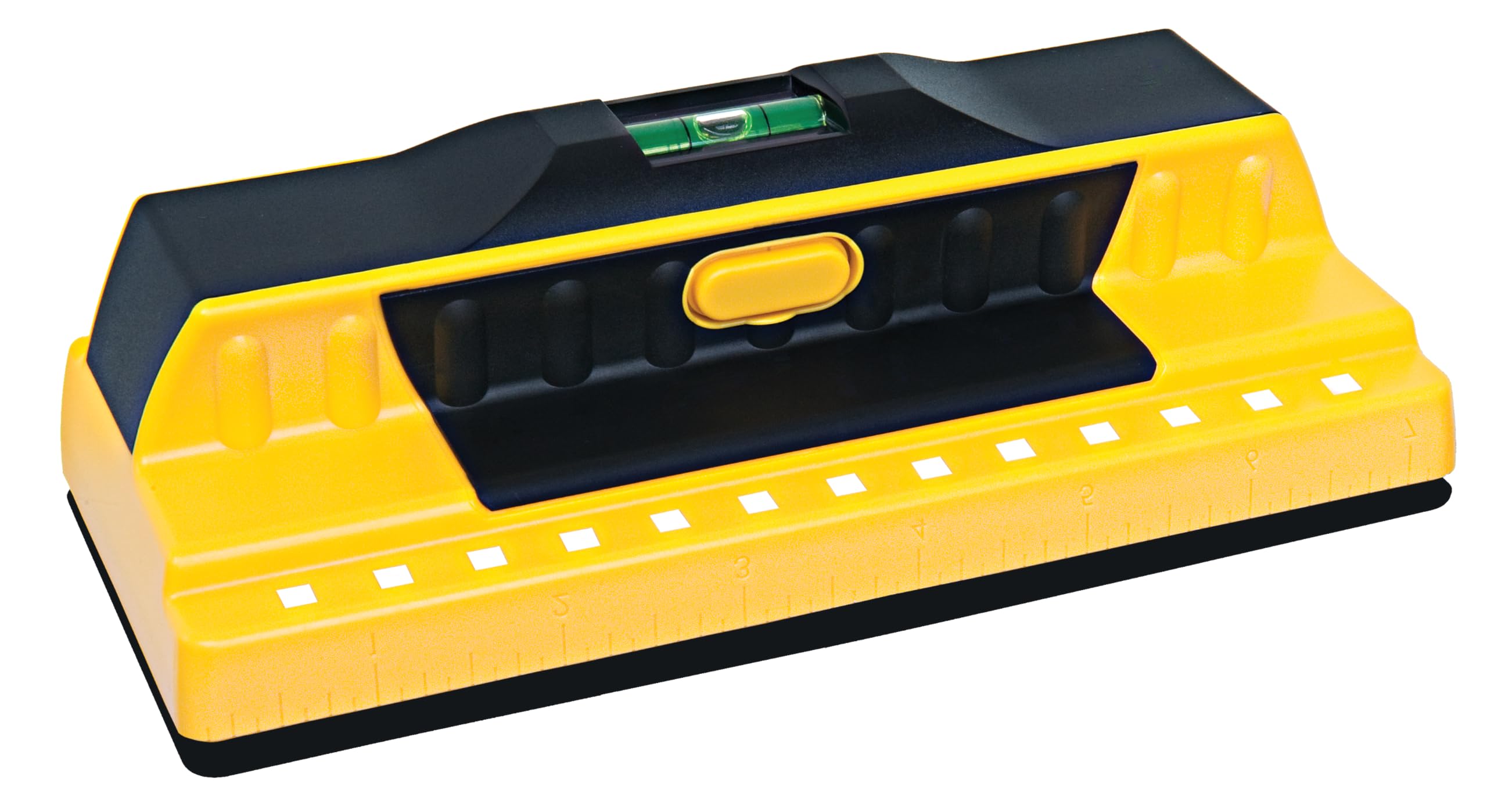
If you’re looking for a stud finder that is accurate, easy to use, and durable, the Franklin Sensors FS710PRO ProSensor 710+ Professional Stud Finder is a great option.
PROS
CONS
In our experience, the Franklin Sensors FS710PRO ProSensor 710+ Professional Stud Finder is a top-of-the-line product that is worth the investment. The 13 sensors and deep sensing capability make it one of the most accurate stud finders we’ve used, and the one-step operation is incredibly easy to use.
The ProSensor 710+ also has a built-in bubble level, which is a nice added feature that makes it a 2-in-1 tool. Additionally, the ProSensor 710+ is durable and can withstand being dropped or tossed into a toolbox.
One thing to keep in mind is that the ProSensor 710+ is battery-powered, so you’ll need to keep a supply of AA batteries on hand. Additionally, it may be a bit more expensive than other stud finders on the market, but we believe the accuracy and ease of use make it worth the investment.
Overall, if you’re looking for a stud finder that is accurate, easy to use, and durable, we highly recommend the Franklin Sensors FS710PRO ProSensor 710+ Professional Stud Finder.
3) Franklin Sensors T6 Professional Stud Finder
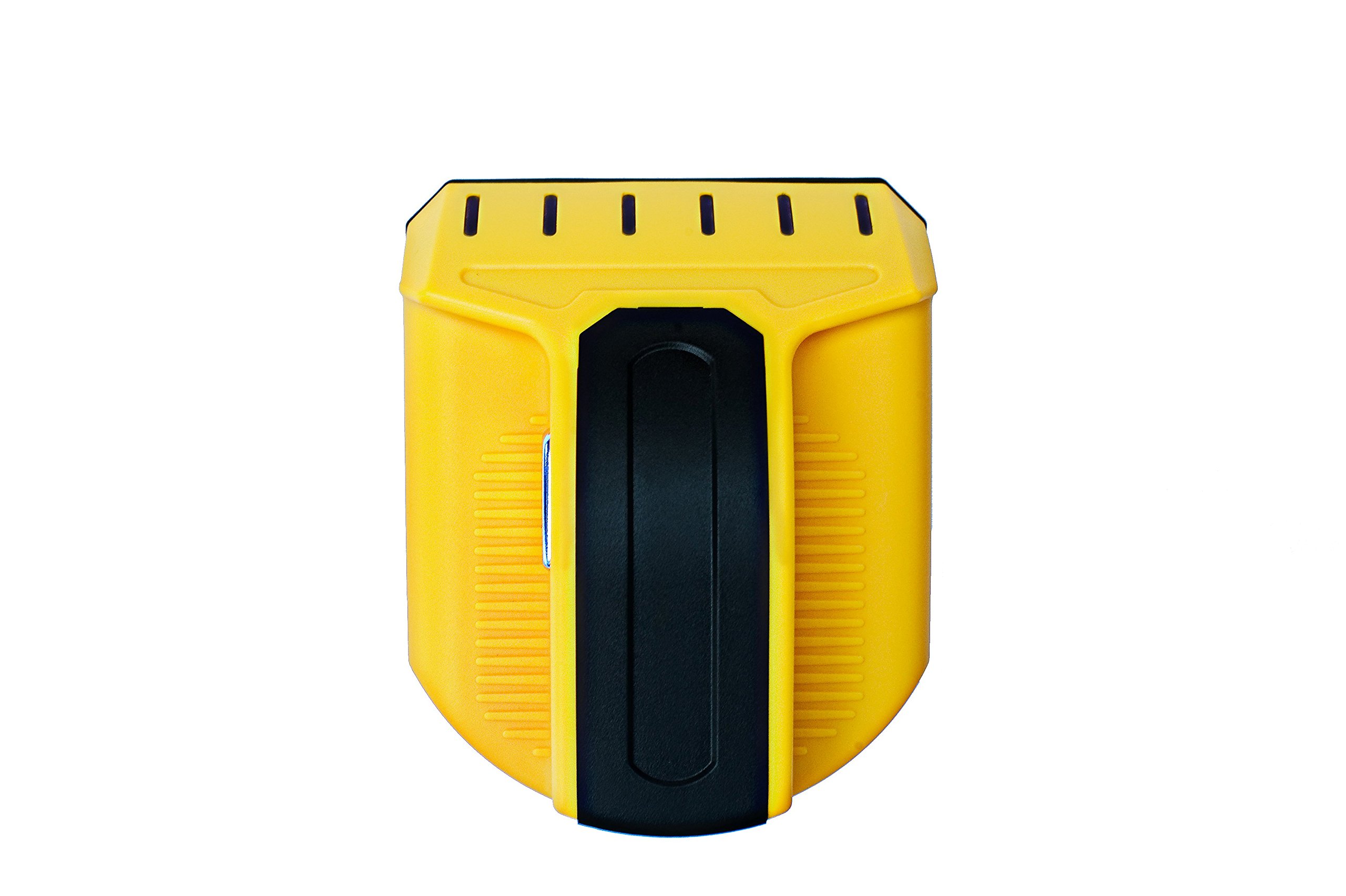
If you’re looking for a reliable and accurate stud finder, the Franklin Sensors T6 Professional Stud Finder is definitely worth considering.
PROS
CONS
Overall, we would definitely recommend the Franklin Sensors T6 Professional Stud Finder. It’s accurate, easy to use, and saves you time and effort when locating studs.
The T6’s six sensors make it incredibly accurate, and the fact that it requires no calibration means that you can start using it right away. The device displays the center and edges of studs simultaneously, making it easier to locate studs quickly and efficiently.
One potential downside to the T6 is that the flashing lights can be confusing and not specific enough to indicate the center of the stud. Additionally, the batteries can pop out easily if the device is dropped, which can be frustrating.
Despite these minor drawbacks, we believe that the Franklin Sensors T6 Professional Stud Finder is an excellent choice for anyone looking for a reliable and accurate stud finder.
4) Povlen Stud Finder

If you’re looking for a reliable stud finder with laser level, we recommend the Povlen Stud Finder. It’s accurate, efficient, and easy to use, making it a great tool for DIY projects around the house.
PROS
CONS
Overall, the Povlen Stud Finder is a great choice for anyone looking for a reliable and efficient stud finder. It’s easy to use and can help you avoid potential hazards when installing TVs, cabinets, and other items on your walls.
5) Franklin Sensors ProSensor M150 Professional Stud Finder
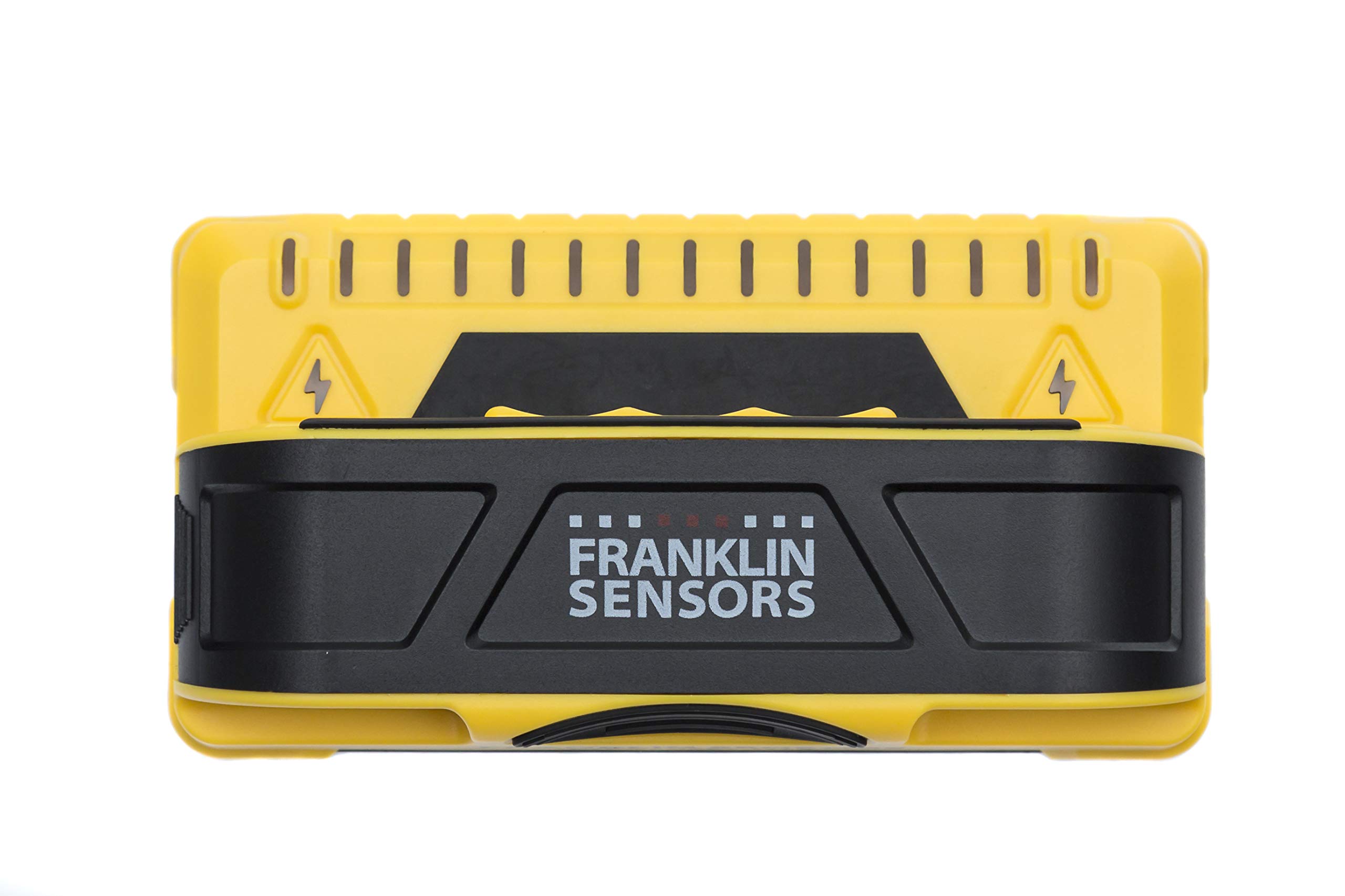
We highly recommend the Franklin Sensors ProSensor M150 Professional Stud Finder for those looking for a reliable and easy-to-use stud finder.
PROS
CONS
The Franklin Sensors ProSensor M150 Professional Stud Finder is a great choice for anyone who needs a reliable and accurate stud finder. The device is easy to use and provides accurate results, even in older homes with irregular stud configurations. The M150 is also durable and can withstand being dropped or tossed into a toolbox. Overall, we highly recommend the Franklin Sensors ProSensor M150 Professional Stud Finder for anyone looking for a reliable and accurate stud finder.
6) Homder Stud Finder Wall Scanner

If you’re looking for a reliable and affordable stud finder, the Homder Stud Finder Wall Scanner is definitely worth considering.
PROS
CONS
We recently had the opportunity to try out the Homder Stud Finder Wall Scanner and were impressed with its performance. The 5 different modes make it easy to detect different materials including wood, metal, and AC wires. The upgraded smart sensor technology allows for accurate and quick detection, and the large LCD display and audio alarm make it easy to locate the exact position of the studs.
One potential downside is that the battery life could be better and may need to be replaced frequently. Additionally, some users have reported that the calibration process can be a bit finicky and may take some practice to get right. Finally, the stud finder may not work as well on thicker walls or materials.
Overall, we would definitely recommend the Homder Stud Finder Wall Scanner for anyone looking for an affordable and reliable stud finder. Its ease of use and accurate detection make it a great choice for DIY projects and home improvement tasks.
7) BOSCH GMS120 Digital Multi-Scanner
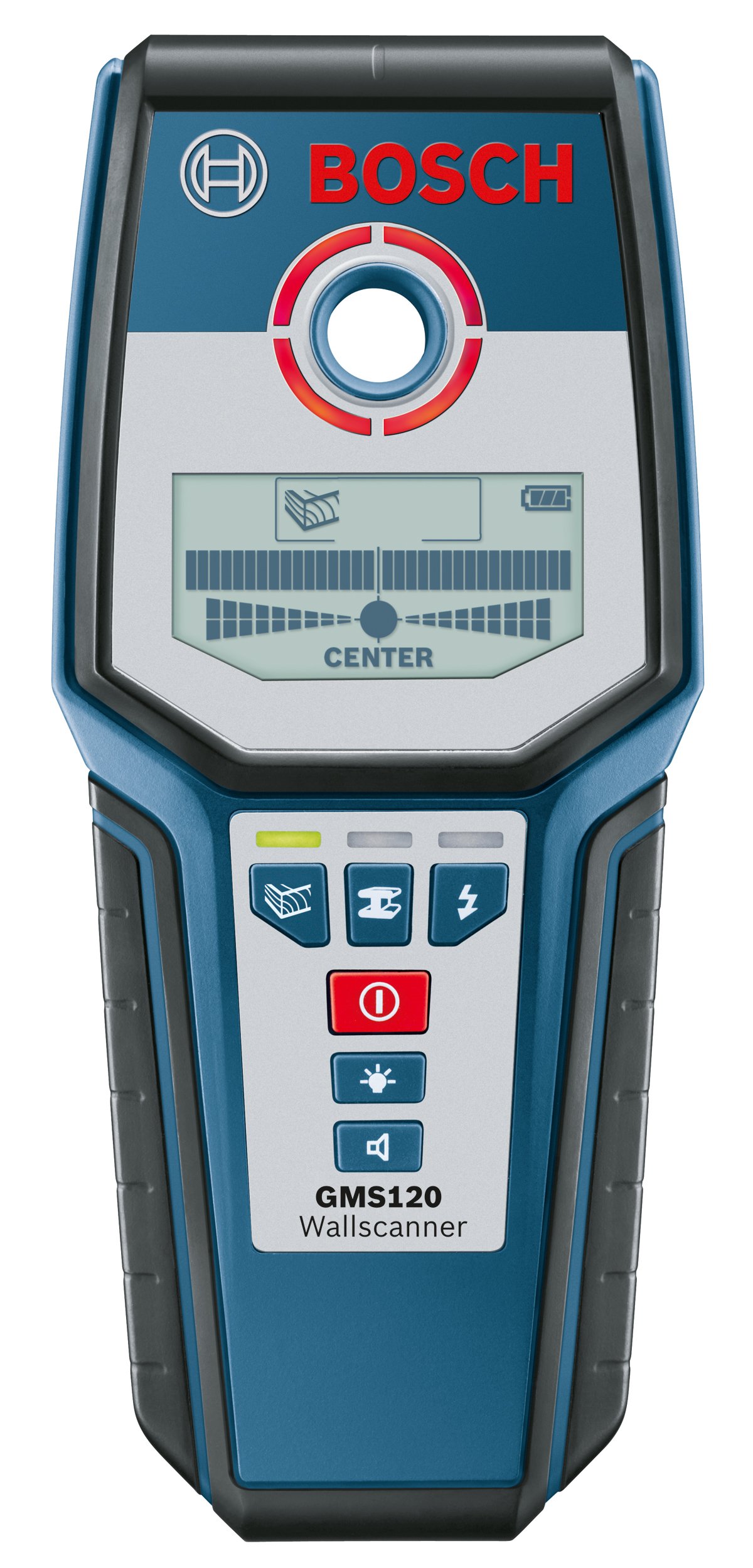
If you’re looking for a reliable and versatile stud finder, the BOSCH GMS120 Digital Multi-Scanner is a great option.
PROS
CONS
We’ve used the BOSCH GMS120 Digital Multi-Scanner for various construction projects, and it consistently performs well. The three available modes make it versatile and useful for a variety of materials, and the automatic calibration and center finder features make it easy to use.
The deep detection feature is particularly impressive, allowing us to detect steel up to 4-3/4 inches deep in cured concrete. The illuminated graphical LCD display is also a nice touch, providing clear and easy-to-read information about detection status and more.
Overall, if you’re in need of a reliable and versatile stud finder, the BOSCH GMS120 Digital Multi-Scanner is a great option to consider.
8) Franklin Sensors ProSensor M210 Professional Stud Finder

If you’re looking for a reliable and accurate stud finder, the Franklin Sensors ProSensor M210 Professional Stud Finder is a great choice.
PROS
CONS
We recently used the Franklin Sensors ProSensor M210 Professional Stud Finder during a home renovation project and were impressed with its accuracy and ease of use. The 13 sensors and 21 Enhanced Precision LEDs made it easy to detect studs and other materials behind walls, and the auto-select mode made it easy to switch between different materials without having to manually adjust the settings.
The display shows the center and edges of studs simultaneously, which saved us time and made it easy to identify the exact location of the studs. The M210 also has a live electrical warning feature, which is a nice safety feature for DIY enthusiasts and professionals alike.
Overall, we highly recommend the Franklin Sensors ProSensor M210 Professional Stud Finder for anyone in need of a reliable and accurate stud finder.
Buying Guide
When it comes to buying a stud finder, there are a few features to consider to ensure that you get the best product for your needs. Here are some key factors to keep in mind:
Type of Stud Finder
There are two main types of stud finders: magnetic and electronic. Magnetic stud finders use a magnet to detect the metal nails or screws that hold the studs in place, while electronic stud finders use sensors to detect changes in the density of the wall. Electronic stud finders are generally more accurate, but they can be more expensive.
Detection Depth
The detection depth of a stud finder is how deep it can detect a stud behind the wall. This is an important factor to consider if you have thicker walls or if you need to detect studs behind multiple layers of drywall. Look for a stud finder with a detection depth of at least 1.5 inches.
Display
The display of a stud finder can vary from a simple LED light to a digital display. A digital display can provide more detailed information, such as the exact location and width of the stud. Look for a display that is easy to read and understand.
Additional Features
Some stud finders come with additional features, such as a built-in level or the ability to detect live electrical wires. Consider what features are important to you and your specific needs.
By considering these factors, you can choose the best stud finder for your needs and ensure that you can accurately detect studs behind your walls.
Frequently Asked Questions
What features should I look for in a professional stud finder for reliable accuracy?
When looking for a professional stud finder, you should look for features such as deep scanning capabilities, multiple scanning modes, and easy-to-read LCD displays. These features can help ensure reliable accuracy when detecting studs behind walls. Additionally, look for stud finders with ergonomic designs that are comfortable to hold and use for extended periods.
How does the Franklin stud finder compare to other top models on the market?
The Franklin stud finder is a reliable and accurate option that compares favorably to other top models on the market. It features deep scanning capabilities, multiple scanning modes, and an easy-to-read LCD display. Additionally, it has an ergonomic design that is comfortable to hold and use for extended periods.
Which stud finder is recommended by experts on home improvement forums like Reddit?
Experts on home improvement forums like Reddit often recommend the Franklin stud finder for its reliable accuracy and ease of use. Other popular options include the Zircon stud finder and the Bosch stud finder.
Are there any stud finder apps that can effectively replace traditional devices?
While there are stud finder apps available, they are generally not as reliable or accurate as traditional stud finder devices. These apps often rely on the magnetometer in your smartphone, which can be affected by external factors and may not provide accurate readings.
What makes the Zircon stud finder a popular choice among DIY enthusiasts?
The Zircon stud finder is a popular choice among DIY enthusiasts due to its affordable price point and reliable accuracy. It features multiple scanning modes, an easy-to-read LCD display, and a compact design that is easy to use in tight spaces.
What type of stud finder is best suited for detecting studs in plaster walls?
When detecting studs in plaster walls, it is best to use a stud finder with deep scanning capabilities. This can help ensure that the device can penetrate the plaster and detect the studs behind it. Additionally, look for stud finders with multiple scanning modes, such as metal and live wire detection, to help avoid potential hazards.



